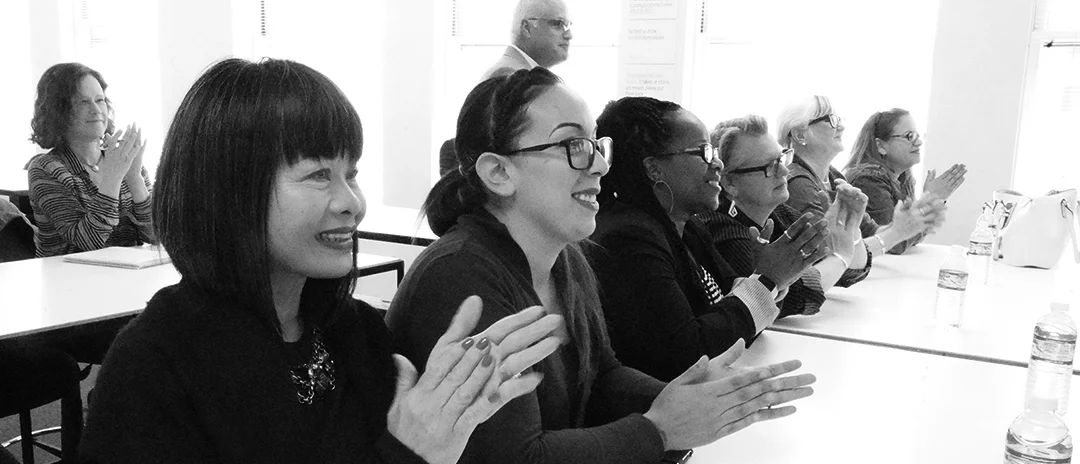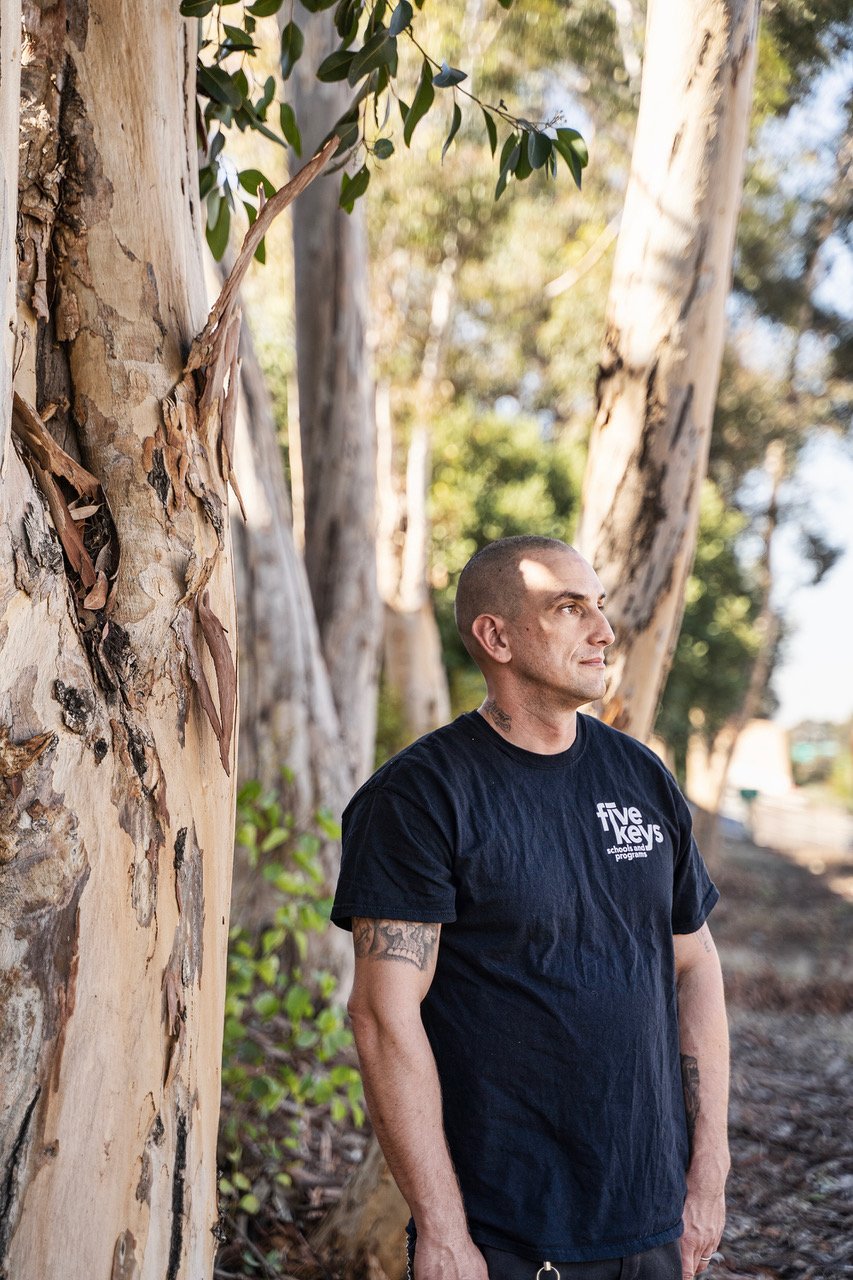Patrick Bayona and Joe Durant at the Five Keys 21st Anniversary Celebration
In his almost 14 years with Five Keys, Joe Durant has seen thousands of lives transformed—but few encounters impacted him as deeply as the day he first met Patrick Bayona. At the time, Joe was serving as the College Transition Manager, providing one-on-one educational case management to help students pursue college while still incarcerated. That’s when he met Patrick in the Reentry Pod at San Francisco County Jail 2—one of just ten men classified as violent offenders in the unit. Patrick was surviving the only way he knew how: through art. His drawings weren’t just creative expression—they were his lifeline, a way to reclaim identity and hope behind bars.
Joe was struck not just by the raw talent in Patrick’s pencil sketches, but by the resilience behind them. “I saw someone who just needed a hand in the right direction,” Joe recalls. And that’s exactly what he offered. Alongside other Five Keys educators, Joe became a steady source of encouragement, helping Patrick take his first steps toward something better when he was released from jail in 2022, connecting him with the opportunity to pursue his artistic talent.
Fast forward to Spring 2025. Joe, 38, is now Assistant Director of Grants and Development. He happened to be visiting the Five Keys’ Embarcadero SAFE Navigation Center, and much to his surprise was reunited with Patrick. Patrick boasted about his upcoming graduation from the Academy of Art University in San Francisco and his post as Activities Coordinator for the Navigation Center.
Thanks to the support of Joe and the broader Five Keys team, Patrick was awarded a full-ride scholarship to an art academy, made possible through a Five Keys partnership. The scholarship was contingent on Patrick’s success in completing a semester at Laney College in Oakland—a challenge he met with a 3.5 GPA.
“It was one of those moments where you realize—wow, what we’re doing really matters. It’s changing lives,” says Joe. “One of the most meaningful parts of my job is hearing our clients’ stories and helping them navigate systems that can feel impossible—financial hurdles, legal barriers, even the countless fees just to register for basic services. Parole paperwork, for example, has been shown to be more difficult to understand than a New York Times article, often leading to violations simply due to misunderstandings—violations that can send someone back to prison. My role is to walk alongside them, guide them through the process, and be their advocate.”
Navigating New Pathways
The dictionary defines a navigator as “a person who directs the route or course of a ship, aircraft, or other form of transportation, especially by using instruments and maps.”
To say that Joe is a navigator extraordinaire for the incarcerated and prisoners dreaming and then transitioning to re-entry is to understate.
“I cannot imagine the odds stacked against them,” says Joe. “In my current role I’m not behind the scenes in the jails as I used to be, but when I was there, I felt it was so important to be real with the clients. My job was to stand by their side to walk them through all the barriers and obstacles.”
To that end, as a navigator for currently and formerly incarcerated individuals, Joe is a member of a network of change makers who are offering a promising approach to improving reentry outcomes. By providing personalized support and connecting prisoners with educational and vocational resources, Joe and other navigators play a critical role in reducing recidivism and helping ex-offenders successfully reintegrate into society.
Studies have shown that having a navigator can significantly improve the outcomes for ex-offenders. A study by the Urban Institute found that participants in a navigator-guided reentry program were more likely to be employed and less likely to be rearrested compared to those who did not receive such support.
Determined to Right Wrongs
Joe’s journey to becoming one of the most trusted figures in the fight for incarcerated individuals’ rights and opportunities didn’t start with a grand vision—it started with a deep curiosity and a fierce drive to right the wrongs he saw within the justice system.
His path to his current role in Development—where he works tirelessly to secure funding for Five Keys’ programs—began in his early collegiate years, shaped by both academic and personal experiences that ignited his passion for advocating for those impacted by incarceration. From college criminal justice studies to groundbreaking reentry programs, Joe's commitment to breaking the cycle of incarceration is a mission that has shaped his adult life.
While studying Criminal Justice at California State University, Chico, Joe dove headfirst into hands-on work through the Community Legal Information Clinic (CLIC)—one of the oldest undergraduate legal clinics in the country. It was here, as a paralegal intern in the Penal Law Project, that Joe began making visits to CDCR Solano, providing free legal information to incarcerated individuals. These early experiences opened his eyes to the systemic issues within the criminal justice system, particularly the racial inequities deeply embedded in California’s carceral policies.
“I saw how inefficient the system was and it just drove my passion to make change,” says Joe.
For Joe, the academic course Corrections acted as a critical turning point. It was in these classrooms and through his interactions with those on the inside that Joe solidified his commitment to becoming a voice and a resource for those impacted by the system. His experience with CLIC also fueled his desire to tackle the broader social issues of policy and systemic change. As he pursued his Master’s in Public Administration, Joe deepened his understanding of how political systems perpetuate cycles of injustice, culminating in a graduate thesis on corruption in California’s initiative process.
Joe’s path took a significant turn after graduate school when he joined the San Francisco Adult Probation Department, where he worked with clients in the Learning Center, helping them complete their high school diplomas and GEDs. It was here that Joe first connected with Five Keys, eventually beginning his work teaching independent study and digital literacy classes in San Francisco’s jails.
His role soon expanded into school administration, where he led efforts to overhaul Five Keys’ outdated transcript request system, improving access and efficiency for students and staff. He later served as the Transition Coordinator for Special Education, where he helped design and guide transition plans within students’ IEPs, ensuring connections to higher education, apprenticeship programs, and employment preparation services.
Joe and Steve Good, President and CEO of Five Keys, holding a proclamation from the Mayor of San Francisco declaring Five Keys Day at the 20th Anniversary Celebration.
Joe’s work within Five Keys expanded further when he became the College Transition Manager, leading efforts to build educational pathways for incarcerated students. His leadership in bringing college coursework into County Jail 5 and 2 helped numerous individuals earn up to 12 college credits per semester. His contributions extended beyond the jails when he played a pivotal role in connecting justice-impacted students to post-secondary retention programs, ensuring they had support networks that spanned the Bay Area. These efforts contributed to the creation of reentry pathways and opportunities, setting up incarcerated individuals for successful reintegration into society and success in higher education.
Despite these successes, Joe's work isn’t limited to just education—he has been a tireless advocate for reentry services. He was deeply involved in providing services for “A-Pod” (also known as the Reentry Pod), a reentry-designated housing unit at County Jail 2, aimed at providing wraparound services and close collaboration with probation officers to ensure successful reentry. Joe’s approach was holistic—offering job readiness training, digital literacy skills, and college enrollment and retention support, all geared toward helping individuals build a strong foundation for their future.
When the pandemic reshaped the world, Joe adapted quickly, transitioning into Development and Fundraising. In his current position as the Assistant Director of Government and Foundation Grants, he continues to channel his years of experience into securing funding for programs aimed at breaking the cycle of incarceration. His efforts have resulted in multi-million-dollar contracts that support Five Keys' expanding network of services, including educational programming, supportive housing, reentry services, and workforce development for justice-impacted individuals. Having worked directly with students and clients, Joe knows firsthand that the most powerful way to connect with funders is by sharing the real stories of transformation happening in the field—stories that illustrate not just need, but impact.
Believing in Second Chances
At his core, Joe’s work is driven by the belief that everyone deserves a second chance—and sometimes a third, fourth, or more. In California, nearly 4 in 10 people released from prison or jail are reconvicted within three years, underscoring the urgent need for sustained support and multiple opportunities for success. He has seen firsthand how systemic inequities—such as racial discrimination, over policing of marginalized communities, underfunded education systems, and a lack of economic and educational opportunities—stack the odds against incarcerated individuals. This deep sense of injustice fuels his passion for systemic change and his commitment to the mission of Five Keys: education, employment, recovery, family, and community. Joe’s role has helped break down the barriers that many incarcerated individuals face, opening doors to new opportunities and new lives.
Now, as Assistant Director of Grants and Development, Joe is not just navigating the path of reentry for others—he’s paving the way for an entire community of justice-impacted individuals to thrive. His work stands as a testament to the transformative power of education and the belief that everyone, no matter their past, deserves a chance to succeed.
Away from work, Joe lives in Chico with his wife, Maggie, and their Chihuahua, Hazel. He and Maggie first met while attending California State University, Chico, where they both graduated and remain proud alumni. There, the trio spend days hiking, attending concerts, and traveling. Plans are already underway for Joe’s 40th birthday in December 2026, with Maggie organizing a destination celebration abroad.
Maggie, Joe, and Hazel
“I feel very blessed to be part of the solution—and to play a role in helping others transform their lives. They’re the ones doing the hard work to rewrite their stories; we just help set the stage for their success. I have a lot to be grateful for and celebrate,” says Joe.






